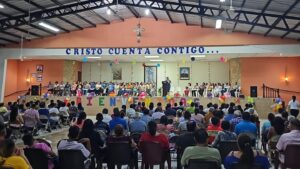The Easter Triduum gives us a new opportunity to be renewed and revivified by its experience. Its proximity urges us to ask ourselves if during Lent we have prepared our clay, if we have generated the conditions of possibility so that the experience of the Easter Triduum allows us to take a step closer to the Lord.
To a large extent, how we have lived Lent, how we have prepared ourselves, conditions that possibility. However, our weakness, our lukewarmness, does not mortgage us because we can always begin again; that possibility is part of what we are about to celebrate in the Easter Triduum.
In this Holy Week we have, therefore, the opportunity to make new the experience of Easter. Easter is joy, and happiness, but it is a joy and happiness that arises from the previous experience of pain and apparent failure. To live Easter is to experience and live that joy after having experienced and lived through suffering.
However, none of this is so easy. We are numb, anaesthetised, at best, distracted by many things that, also out of goodwill and the desire to serve God, prevent us from experiencing and living Easter. We need to recover our sensitivity. The Lenten journey is preparation for the Easter experience. Fasting, abstinence and almsgiving have had to help us to sharpen our sensitivity to grasp the depth of Jesus’ willing self-giving for each of us and what he suffered in those long hours. But they also enable us to live with deep joy the joy of the resurrection, that final and definitive word of God over the world.
St. Ignatius used to say that it is not much knowledge that fills and satisfies the soul, but inwardly feeling and tasting the things of God. Today we could paraphrase this Ignatian aphorism and say that it is not much doing that fills and satisfies the soul. Because that is where almost all of us are, in doing many things, I insist, also from the desire to serve God. Jesus said to Martha a few days before Easter, “Martha, Martha, you worry and fret about many things; and there is need of few, or rather, of only one. Mary has chosen the good part, which will not be taken away from her” (Lk, 10, 38-42). Perhaps we are not worried or agitated, only distracted in believing that doing is more important than being. To live is to be, not to do, and if we do not convince ourselves of this and start putting it into practice, we will be proving right to those who believe that for those who cannot do, there is no point in living.
This Holy Week we have a new opportunity for this, to grow in being from God, we receive ourselves from Him, in Him we live, move and exist and from that experience be for the world.
Let us begin this experience by feeling and savouring internally the experience of the Easter Triduum. In the experience of the third week of the Spiritual Exercises of St. Ignatius, we find many clues for this. I will dwell on just a few of them, namely, what St. Ignatius proposes that we “demand” in contemplating the Passion.
Ignatian contemplations have a structure that begins with a preparatory prayer, continues with a preamble that prepares us for the points of contemplation and ends with a colloquy between the person doing the contemplation and Jesus.
St. Ignatius proposes in the preamble that we demand what we want, and what we want, according to St. Ignatius, is pain, feeling and confusion because for our sins, mine and yours, the Lord is going to the Passion. Perhaps the first question we should examine is whether this is really what we want this Holy Week, do we want to feel this pain and confusion? Because we usually run away from pain and confusion; indeed, we usually turn to God to run away from the pain and confusion in our lives. Does our heart really want to come to the Lord this year to experience pain?
Later, insisting on this, St. Ignatius again proposes that we demand brokenness with the broken Christ, pain with the sorrowful Christ, tears and inner sorrow of so much pain that Christ went through for you, for me.
We demand what we don’t have, so we have to ask for it. We have become accustomed to suffering, especially the suffering of others. We are moved by the pain of those who suffer, but not enough to transform our lives, to break them. And that is why it is a Grace that is given to us.
But the point of experiencing authentic pain is not to martyr ourselves. As St. Ignatius himself points out, to consider how all the suffering and suffering of Jesus is for you, for me, for each one of us, is a condition of possibility to get out of our self-referentiality and ask ourselves what we have done for Him, what we can do for Him and what it is our turn to suffer for Him. Perhaps this last question is the easiest to answer because what you have already suffered or what you are suffering now is what you must suffer for Him and with Him.
If we need to ask for the grace to feel the pain, we also need to demand, to ask for, the grace to rejoice and rejoice intensely in so much glory and joy of Christ our risen Lord. But it is only from the experience of the pain of Christ’s suffering that we can experience and live the depth of the joy of the Resurrection. In life, we want to spare ourselves the first part, but without the first part, the second part is not possible, at least not in all its depth.
Can you feel the pain of Christ on the cross? Are you aware that he is there nailed for you? Can you live this with gratitude and not with guilt, which always refers to our self-referentiality? How much is this able to change the way you live? Can you feel and taste the joy of the Resurrection? Do you feel how that deep, inner joy sustains your life when difficulty comes? How deep is your experience to sustain your hope when reality seems determined to put it to the test?
Happy inner knowledge of Easter, may it lead you to love and follow Him more!
Araceli de los Ríos Berjillos – Cursillo Nº 907 de Córdoba (España)
Responsable del Secretariado de Misión Compartida de la Compañía de Jesús.






